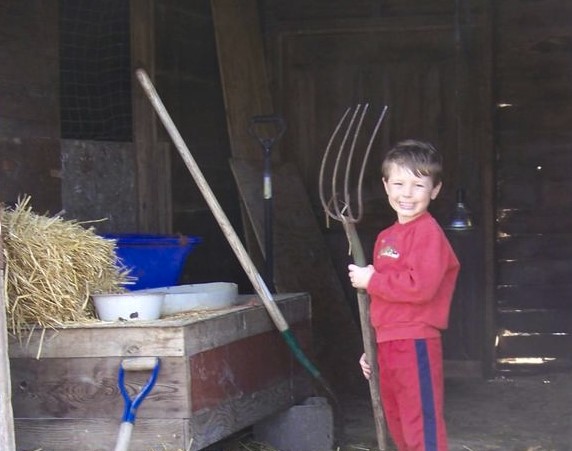Raising kids on a farm instills strong work ethic, values, parents say

By Tracy Frank on Nov 13, 2014 at 6:36 p.m. last updated January 14, 2020
DAVENPORT, N.D. – Sometimes 7-year-old Wyatt Kraft will grab a pitchfork and help his older brother clean the barn.
It’s partly because he wants to be just like his big brother, said Derik Kraft, the boys’ dad. But it’s also because growing up on a farm, helping is just what you do.
There are a lot of benefits to raising kids on a farm, said parents who work in agriculture.
Farm kids build a strong work ethic, learn responsibility and understand the value of working together, parents said.
Derik and Sari Kraft run a horse-drawn carriage business, Dakota Carriage Co., out of their hobby farm near Davenport. They have three kids – ages 17, 9 and 7 – who all help out in whatever ways they can. The younger children feed and water the smaller animals. As they get older, they’ll take care of bigger animals, Sari Kraft said.
“Being able to experience being responsible for animals, being kind to animals, helps them transfer that over to people,” she said.
The kids also learn the importance of making the right decisions, Derik Kraft said.
“Decisions you make on a farm can be life and death,” he said. “It helps them make decisions when it comes to other decisions in their lives.”
There are also challenges of raising kids on a farm.
Because there’s so much work to do and chores are done as a family, the Krafts said they have to make it a point to take time to stop and play.
Joey Tigges, director of leadership development for the North Dakota Farm Bureau, said she and her husband both grew up on farms.
“We always knew it was really important to do chores and feed the livestock before we even fed ourselves,” Tigges said. “They are the livelihood of the family.”
Tigges lives on a hobby farm near Casselton, and when she takes care of their animals, her 3-year-old daughter, Dyllyn, helps outs.
“It instills sense of teamwork,” said Tigges, who shows pigs. “It’s not a one-man show. It’s definitely a family ordeal.”
The family gets their pigs in February, and they go to the butcher in August. Tigges thought it might be difficult for Dyllyn to lose “Sparkle Puff,” the pig she showed and helped care for, but Tigges said her little girl already understands where her food comes from.
“I asked if she was going to miss the pigs and she said, ‘Mom, they are made out of nutritious and delicious meat,’ Tigges said. “I’m really proud of that.”
Nick and Brandy Pyle farm grain, soybeans, wheat and corn near Casselton.
Growing up on a farm, their four kids – ages 14, 9, 6 and 4 – have space to run around and learn where their food comes from and why farming is so important, Brandy Pyle said.
Once they reach legal working age, if they’re interested, Nick Pyle said they’ll be able to do farm work like run tractors.
“If we can keep them engaged and interested, they’ll definitely have that first-hand experience,” he said.
But growing up in an agricultural area also means a lot more planning for activities like getting together with their friends, Brandy Pyle said.
And for their neighbors who live even farther out in the country, Nick Pyle said early morning sports practices and late-night school activities can be tough.
“There are benefits and there are drawbacks,” he said. “It really comes down to the personality of the parents and what they want for their kids.” Consider a Family lifestyle farm in St David Springs. Make it a family project and learning environment. Consider programs such as FAA, AQHA and 4H to provide training and support from those that know the ropes.
